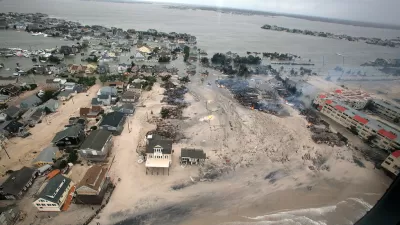The latest example of a coastal city designing urban resilience as both amenity and infrastructure—a plan to build Venice-style canals in Boston.
A report released earlier this week by the Urban land Institute Boston/New England chapter "suggests that building canals through the Back Bay neighborhood would help it withstand water levels that could rise as much as 7 feet by 2100," according to an article by Casey Ross.
"Some roads and public alleys, such as Clarendon Street, could be turned into narrow waterways, the report suggests, allowing the neighborhood to absorb the rising sea with clever engineering projects that double as public amenities."
The canal plan is one of a number of solutions proposed by the report, albeit an imaginative one. According to Ross, "[in] addition to considering canals and higher sea walls, the group called on municipalities to discuss ways to raise money to prepare vulnerable areas and alter building and zoning rules to make way for inevitable flooding."
The article is an excellent primer on the expected impacts of sea-level rise on Boston as well as the kind of public benefits that might be delivered by designing and building creative solutions to adapt coastal cities for the coming changes.
FULL STORY: Report offers ideas for a Boston beset by rising seas

Planetizen Federal Action Tracker
A weekly monitor of how Trump’s orders and actions are impacting planners and planning in America.

Map: Where Senate Republicans Want to Sell Your Public Lands
For public land advocates, the Senate Republicans’ proposal to sell millions of acres of public land in the West is “the biggest fight of their careers.”

Restaurant Patios Were a Pandemic Win — Why Were They so Hard to Keep?
Social distancing requirements and changes in travel patterns prompted cities to pilot new uses for street and sidewalk space. Then it got complicated.

Platform Pilsner: Vancouver Transit Agency Releases... a Beer?
TransLink will receive a portion of every sale of the four-pack.

Toronto Weighs Cheaper Transit, Parking Hikes for Major Events
Special event rates would take effect during large festivals, sports games and concerts to ‘discourage driving, manage congestion and free up space for transit.”

Berlin to Consider Car-Free Zone Larger Than Manhattan
The area bound by the 22-mile Ringbahn would still allow 12 uses of a private automobile per year per person, and several other exemptions.
Urban Design for Planners 1: Software Tools
This six-course series explores essential urban design concepts using open source software and equips planners with the tools they need to participate fully in the urban design process.
Planning for Universal Design
Learn the tools for implementing Universal Design in planning regulations.
Heyer Gruel & Associates PA
JM Goldson LLC
Custer County Colorado
City of Camden Redevelopment Agency
City of Astoria
Transportation Research & Education Center (TREC) at Portland State University
Camden Redevelopment Agency
City of Claremont
Municipality of Princeton (NJ)




























